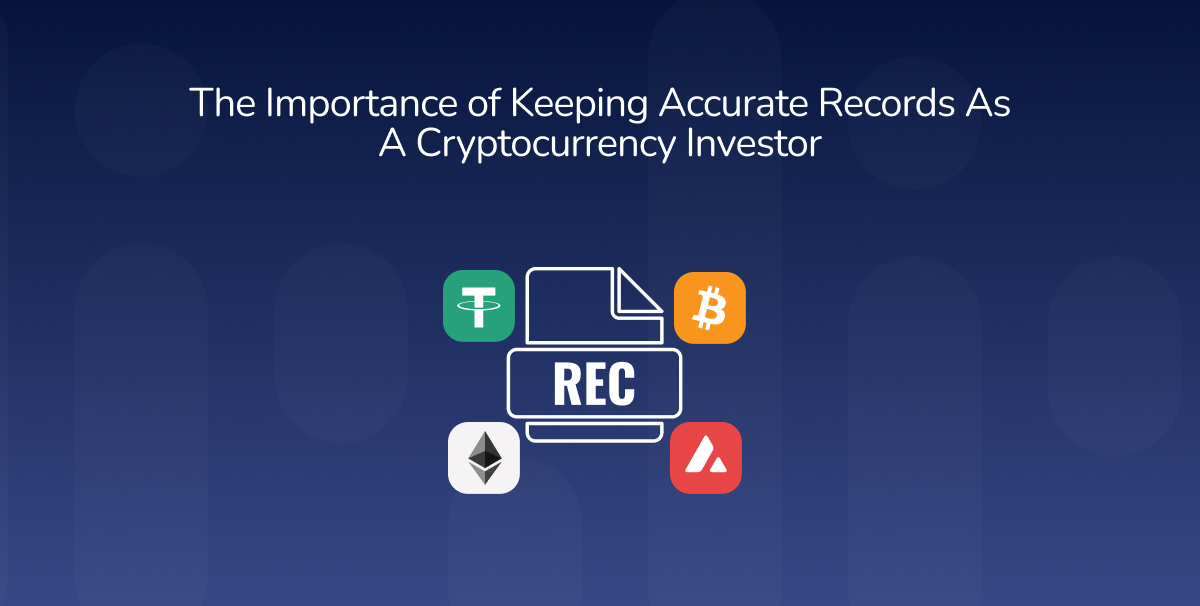
The Importance of Keeping Accurate Records As A Cryptocurrency Investor
Making sure that you stay compliant with tax regulations is such an important task for cryptocurrency investors. Whether you're simply trading crypto as a side hobby or diving into it as a full-time income source, maintaining accurate records is a critical part of managing your investments.
With increasing scrutiny from HMRC, failing to keep proper documentation could lead to unexpected penalties or fines- which isn’t something that anyone wants to face.
To bring you up to speed, here’s an overview of why keeping accurate records is crucial and how to ensure you're following best practices.
Understand Your Tax Obligations
In the UK, cryptocurrencies are treated as assets, meaning that any profits you make from selling or exchanging them are subject to Capital Gains Tax (CGT). For the 2024/25 tax year, the CGT allowance stands at £3,000, with any amount over this being taxed at 10% for basic-rate taxpayers and 20% for higher-rate taxpayers.
It’s important to note that starting from April 2025, the rates of CGT are increasing as per the changes outlined in the Autumn Budget. As a result they will change to being at 18% for basic-rate taxpayers and 24% for higher-rate taxpayers .
If you're dealing with crypto transactions regularly, this tax can quickly add up, making it essential to know how much you're liable for. If you're receiving cryptocurrency as income—for instance, through mining, staking, or payments for services—you’ll also need to report this as income and pay Income Tax on those earnings. Failing to categorise your crypto earnings correctly can lead to hefty penalties, so make sure that you’re aware of this difference.
Why Proper Record-Keeping Matters
Accurate record-keeping really is the foundation of staying compliant with HMRC rules. This isn't something you can afford to overlook since HMRC requires you to report every crypto transaction. Keeping detailed records ensures that when it comes time to submit your tax return, you have all the necessary information readily available. This includes:
- The date of each transaction
- The type of transaction (e.g., buying, selling, or receiving income)
- The number of cryptocurrency units involved
- The value of the crypto in £GBP at the time of the transaction
- Any fees associated with the transaction
- Information about the counterparty (if available)
It’s important to remember that crypto-to-crypto trades are also considered taxable events. Even transferring assets between wallets can create confusion, so keeping records of everything, no matter how minor it may seem, is key to avoiding miscalculations.
Use Tools to Simplify Your Record-Keeping
Given the complexities of tracking every single crypto trade or transaction, relying solely on manual record-keeping can be overwhelming. Thankfully however, there are software tools designed specifically to help with this task. Tools like CoinTracker, Koinly, and Accounting can connect directly to your exchanges and wallets, automatically tracking transactions and calculating any gains or losses. They’re also compliant with UK tax rules, ensuring that the information you’re collecting is correctly formatted for your tax return.
Make sure the software you use supports the FIFO (First In, First Out) accounting method, as this is the method typically favoured by HMRC when calculating your taxable gains. Ensuring consistency across all platforms will save you from potential discrepancies when you’re calculating your overall tax liability.
Filing Your Tax Returns Correctly
Once you have your records in place, the next crucial step is to file your Self-Assessment tax return. If you’re dealing with cryptocurrency transactions, it’s important to ensure that you include all gains, losses, and income in the correct sections of the tax return. For Capital Gains, you’ll need to complete the Capital Gains Summary and possibly the Capital Gains Tax Summary (SA108) form.
If you've received crypto as income, it must be reported under employment or self-employment income, depending on how it was earned. Also, if you've incurred losses, these can be claimed to offset your gains, but it’s essential to report them within four years of the tax year in which the loss occurred. This can help lower your tax bill significantly if done correctly.
Be Aware Of Potential Changes
Ever since Labour won the general election earlier this year there have been ongoing talks around changes to Capital Gains Tax which would affect cryptocurrency investors.
Don’t Risk Falling Behind
Cryptocurrency trading can be a highly rewarding activity, but without accurate record-keeping, you run the risk of making costly mistakes when it comes time to file your taxes.
With HMRC increasingly focused on cryptocurrency earnings, now more than ever, it’s important to ensure that your records are detailed, compliant, and easily accessible.
By using the right tools, understanding your tax obligations, and maintaining clear records of every transaction, you can avoid unnecessary penalties and ensure that your crypto investments remain profitable and stress-free.
For more insight on the tax implications of crypto, and how you can ensure your finances are all in order, get in touch with us and check out some of our other blogs.
This article was written by Nordens Chartered Accountants where they offer expert advice and assistance with all of your business needs: from your everyday accounting to Advisory, Tax, Audit and more
For support with any Crypto Tax or accounting services, look no further than Nordens Chartered Accountants. You can contact them by filling out their contact form here to schedule a consultation.

